- Home
- Scott Kenemore
Zombie, Illinois Page 3
Zombie, Illinois Read online
Page 3
On the evening when it starts, I’m downtown at the trendy new venue on the penthouse level of the Trump Tower. I don’t want to be there.
It’s the kind of place that, in Vegas or New York, they’d charge you a cover just to walk in. It has an incredible view, funky décor, and an expensive sound system playing the kind of lounge music that lets you know that drinks are going to be $14 a pop. But it’s Chicago—not Vegas or New York—and it’s a fundraiser for a bicyclists’ lobbying group, so the vibe is laid back, and they let reporters in for free.
The venue has a little stage. A band composed exclusively of good-looking young women has just finished setting up their gear. There will be raffles for bicycle equipment, tedious speeches from local politicians (the reason I am here), a musical performance, and free hors d’oeuvres. (Though not—I note with some regret—complimentary cocktails.)
I wade into the crowd, shaking a few hands and nodding across the room to my counterparts from the Tribune and the Sun-Times. My stomach rumbles. I corner a waiter and steal a handful of chicken meatballs in cream sauce on frilly toothpicks, and then retire to a table at the back and plug in my laptop.
It’s already been a long day. I just want to take notes on a few speeches, file, hop on the El train, and go home. It is snowing a little, and there’s more in the forecast. I want to beat it if I can. Also, the more I think about how there is no alcohol at this event the more I think getting some beers on the way home sounds good. And maybe a pizza.
Soon enough, the trendy lounge music is turned down, and we are underway.
Whoopee.
My fingers poise above my keyboard, but I have all the disinterest (and probably the empty stare) of a court reporter who has heard it all before and will hear it all again.
The first speaker is a thin, awkward man with a beard—he’s the president of the bicyclists’ lobbying group. He speaks about creating a climate of bicycle courtesy on the roads and the need for wider bike lanes. He drives home his point by telling a story about the time he broke his collarbone in a bike collision. He is not a good speaker, but at least his story is interesting.
The local politicians queuing up to go after him are what I’m really dreading—and what a couple of cocktails would considerably improve. None of them knows much about bicycling. They are here for political reasons and will hit all the predictable talking points. I can see it all happening in my mind before it actually does. Blah blah blah public transportation. Blah blah blah reducing carbon emissions. Blah blah blah the i mportance of promoting active lifestyles. Blah blah blah in conclusion, Chicago is a green city.
God. I. Need. A. Drink.
But no. The stars have not aligned.yet.(The liquor store in my neighborhood is called Vas Foremost. It has a high, pleasing smell when you walk inside, like Pine Sol and fruit juice. The kids in the neighborhood call the place “Vas Deferens,” which I secretly think is clever. As the 23rd Ward Alderman takes the podium and begins to drone on about working with the police to reduce bike thefts in her ward, I begin to picture the cooler at the back of Vas Deferens—the one where they stock the giant Belgian beers. I mentally look them over and consider which one I might select for tonight. Hello ladies. How do you do?)
Maybe, if I write really fast, I can turn something in and leave before this shit has concluded. If I’m lucky, I can probably beat the worst of the snow. (My colleagues will likely be none the wiser, and it’s a risk I’m willing to take tonight.) Then home. And pizza. And beer.
I look outside. The white stuff is still coming down, harder than before, which means crowded, snowy, wet trains that take longer to get you anywhere. Blech.
I wonder . . .
Is this the same laptop where I saved the story I wrote about the Green City Initiative fundraiser? Scroll.scroll.scroll. Yes.
Okay, okay. Focus, Ben. Focus. We can do this . . .
Find: “Green City Initiative.” Replace with: “Bicycle Transportation Alliance.”
Find: “Recycling programs” Replace with: “Bike lanes”
Find: “Renewable energy.” Replace with: “Commuting to work on a fucking bike.”
Find and remove: “fucking.”
Aaaaaaaaand . . .
Not bad, not bad at all. Just a few more fixes. Switch out this alderman’s name for that one’s. Change the location from the Chicago Cultural Center to the Trump Tower. Plug in that last bullshit quote the CTA president just read from the speech his PR hack wrote for him . . .
Type type type.
Oh yeah. We’ll be sneaking out the back before this is half an hour in. The article practically writes itself.
(Please understand that my alacrity to leave is not a slight on bicycles themselves. I like bikes. In the summer, I bike to work at Brain’s. I like the bracing rush of negotiating city traffic. I like the other bicyclists too—the skinny kids on fixed gears, the hardcores in full regalia that think it’s the Tour de France, the Mexican busboys on their fat-tire Huffys. I even like the aggressive African cabbies who like to roll down their windows and curse at bicyclists in Xhosa or Wolof. It’s its own little ecosystem, with aspects that are way, way more interesting than city ordinances and helmet laws make it sound.)
Now . . .
If I file too early, it will look suspicious to my editor. I should probably pack up and hit send when I get home. The snow on the windows . . . gee. It’s really coming down. But . . . oh Christ, is that Alderman Dunney waiting to speak? Fuck me, it is.
Alderman Dunney is supposed to be thinking of running for mayor. What if he announces tonight? He almost certainly won’t—why would he here, at a stupid bicyclist’s event?—but if he does and I miss it, I’m almost definitely sacked.
Okay, we wait until Dunney finishes. According to the program, he goes after the CTA guy. It won’t be that long to wait. I hope.
I decide to go take a piss so I won’t have to later. I discreetly close my laptop and stand up. I unhitch a metal side-door as quietly as I can, and ease my way out into a hallway near the stage.
In this hallway, I am abruptly confronted by four young women in coordinated outfits. Sexy coordinated outfits. That’s right, I remember. The band.
The young women are huddled together around a tablet computer resting on a drummer’s plastic bass drum case. The case is completely covered with stickers. Most of the stickers advertise women’s roller derby in some form or another. Others bear clever variations on Rosie the Riveter. Others still declaim “Straight but not narrow,” “Critical Mass,” and “Twisted Scissors.”
The young women—all of them—are absolutely beautiful. And they are sharing a case of beer.
Suddenly, I forget I have to take a leak.
“Oh my gee,” says one of them. “It’s totally a zombie!”
“It can’t be,” says another. “Can it?”
“Are you kidding?” says the first. “It totes is!”
“I heard they’re all being made by a film student out at USC,” says another still. “Like, a special effects guy who interned at ILM.”
“Um, ladies . . . who’s the old guy looking at our asses?”
Gulp.
The jig is up.
“Hi there,” I say. I stand up straight and try to hold in my belly. “Who are yo"?” one of them asks.
It’s hard to tell which one spoke. All these women are beautiful. I am noticing that again and again, and becoming a little flustered as I look from face to face.
“A, uh . . . reporter,” I answer.
“A ‘uh reporter’?” one of them responds.
She turns back toward the computer. Another one—who is tall and black and showing a lot of cleavage—puts her hand on her hip and gives me a “May I help you?” look.
I sigh, turn around, and start to shuffle back down the corridor to the restrooms, my hopes of beer and hot-women-being-around thoroughly dashed.
But then the band member holding the tablet computer says: “Wait, why don’t you see what he thinks?�
��
I slow my retreat and hazard a glance over my shoulder.
And she turns around too—the one using the tablet computer—and she is stunning. The other girls are beautiful, yes, but this one is stunning. She looks like a Latin Joan Jett in her prime. Dark eyes, dark hair, tremendous curves. Neck tattoos like snakes coming up from under her collar. A voice that makes you think of cigarettes, bourbon, and dark, musky perfume.
Wow.
“What’re y’all looking at?” I ask in my most genial Iowan. “The zombie clips” Latin Joan Jett says. “You know, the new ones on the internet?” I nod. I do.
For the last three days, viral videos of what some people are saying are actual zombies have been circulating across social networking sites. Some are shaky, amateur video of corpses at funerals twitching spastically and then falling still again. Some are close-ups of bodies with fingers and toes that suddenly tense and flick like frog’s legs dipped in salt. Other videos show full cadavers prepared for autopsy—or during autopsy—rising from metal examining tables and walking around as medical students or morticians stand by, flummoxed.
They’ve been all over the blogosphere, but hard news outlets have yet to report on them. Nobody is taking them seriously... yet.
“We were talking about those videos in the newsroom just this morning,” I say. “We were cracking up.”
“Cracking up?” she asks. “What if they’re real, though?”
I make a face like this is a crazy idea. Latin Joan Jett frowns and turns back to her screen.
Then I remember that my fellow reporters are not looking over my shoulder.
“But um . . . there are some things about the videos that nobody can explain,” I stammer. “Things that make me think they could be.real.”
“Oh yeah?” she says, turning back to face me. “Like what?.”
“Um, like . . . “ I fumble. “Okay . . . like why the institutions where the footage supposedly comes from haven’t disavowed it. They haven’t said, ‘No, that’s not from our hospital.’”
“Why would they need to do that?” she asks.
“A lot of the videos are from specific hospitals and medical schools, right?” I say. “They’re supposedly posted by med students who are like ‘I shot this with my camera phone on such-and-such day doing rounds at such-and-such hospital.’ Those places are full of doctors and scientists—the types of people who are straight shooters when it comes to what’s real and what’s not. I think if somebody had made fake movies of cadavers in their hospital getting up and twitching, then of course the hospitals would come out and say the videos are fake—CGI tricks or whatever. Of course they would. There’d be a humorously-worded press release about it. It would be cute and be picked up on all the news services. But the hospitals and doctors haven’t done that. There are no cute press releases. No doctors have said that it didn’t happen. They haven’t done anything. That’s what’s scary...
“Yesterday, one of the writers at The Exiled called the PR office at L.A. County, where that video of the dancing zombie was shot—you know. that one?—and he posted the audio of the call, and it’s terrifying. Because the PR guy won’t say ‘No, that didn’t happen.’ He just says things like, ‘What do you think happened?’ And ‘I’m not making a statement like that right now.’”
“See, we’re reporters, and we deal with PR guys all the time. And that’s how they talk when they’ve got something to hide. The hospital where that footage was shot? It’s got something to hide. At least its PR rep thinks it does.”
There is a long pause. Have I totally lost Latin Joan Jett, talking about reporters and PR flacks? Have I been boring and old mannish? I almost certainly have.
Goddamn it.
And then she says, “My name’s Maria Ramirez” and hands me a PBR.
I accept the beer—probably with comically wide eyes—crack it open and have a swallow. Suddenly, I find my urge to get home early has almost completely faded.
I may just stick around to see the show.
Leopold Mack
For all of its helpful pronouncements on subjects relevant to the human soul, the good book has little to say about regret. This is a shame because the topic is so rich. It runs deep. It affects us all.
There are many different kinds of regret. One can regret the done or the undone. (Or even the yet-to-be done.) There is the private regret that hits late at night as you struggle to fall asleep. There is the sloppy, flabby regret that comes with eating, drinking, or flirting too much. (Consequent vows of abstemiousness usually follow this one.) There is the inexorable regret that bombards you when confronted with the consequences of your misdeeds. There is the public regret expressed in front of others—dramatic, exhausting, and usually insincere.
The regret encountered as I climb back into my preacher car and begin the drive back north to Chicago is probably my least favorite of all.
I reactivate my cell phone almost absently. I’m lightheaded. Exhausted. I need a shower.
The tiny phone whirs to life, and soon informs me that I have one voicemail. I hit play and put the phone to my ear. I cringe as soon as I recognize the voice. I scramble to turn down the radio.
The voice belongs to Ms. Washington, one of my oldest and dearest parishioners. She comes from the part of my flock that I inherited when I first took over as pastor of The Church of Heaven’s God in Christ Lord Jesus many years ago. She is ancient and terrible. Smokes three packs a day, yet still breathes like a giant, healthy bellows. Now she breathes into my phone.
She is in need of her pastor, she says. She apologizes for calling at so late an hour, but she has something important to talk to me about. She would like to see me in person, tonight, if possible. Could I see my way to dropping by? Again, she would not call if it were not important. She sounds genuinely upset.
I look at the clock on the dash of my car. 9:30 p.m. And Ms. Washington’s message is from 8:00 p.m. I should be there by now.
Regret.
I would have been there—would have been able to pop over from my house to hers in a few short minutes—had I not driven to Merrillville. I would have done what pastors are supposed to do. I would have been there to comfort one of the most venerable and vulnerable members of my flock. And instead, I indulged myself.
Bad pastor.
It is now snowing. A light snow, but growing steadily with each passing swipe of my windshield wipers. I don’t remember hearing that a blizzard was in the forecast, but storms can sometimes blow in quickly off the lake. As I wind my way northward through dodgy neighborhoods dusted by snow, I dare to hope that Ms. Washington only needs some groceries before the storm hits. Something like that. I remember her as still getting around just fine, but she probably hesitates to use her car in weather like this. Maybe she needs her heart medicine from a pharmacy you have to drive to.
Please let it be something like that.
It has to be.
It almost has to be.
Regret ebbing.
Somewhat.
I turn down 71st Street and eventually merge into Lake Shore Drive, the highway that runs along the edge of Lake Michigan. I drive north at a good clip. There are very few cars on the road. To my left are parks and apartment buildings. The scene to my right varies, but usually shows thirty yards of trees and bike trails, then ten yards of beach, then the endless dark of Lake Michigan beyond.
The flakes are coming down, but not really sticking. Every time I drive this way in the snow, I can’t help but think of the blizzard of 2011. It hit hard and fast, and hundreds of people were trapped inside their cars on this very road. The traffic slowed to a crawl and then to nothing. People couldn’t drive forward or backward. The snow quickly piled up too high to try off-roading, even if you had an SUV. After a few hours, people started running out of gas. The city had to send the fire department out on foot to rescue folks from their cars. It was an all-night operation. The next day, chilling photographs ran in newspapers around the world showing this wintry
wasteland—a snow-blasted highway with rows and rows of gridlocked, abandoned cars leading off forever into the distance.
Tonight, thankfully, traffic is light, and I’m doing forty-five miles an hour even in the snow.
I edge farther north and pass Hyde Park—home of such venerable entities as Louis Farrakhan, Barack Obama, and The
University of Chicago. Then I see something that makes me both furious and utterly astonished.
There are people playing on the beach.
I can scarcely credit it. Am I seeing what I think I’m seeing? I take one hand off my steering wheel and rub my eyes. When I look again, the people are still there. It’s almost unbelievable.
Every twenty yards or so, I see a person walking around, knee-deep in the lake’s icy water. They do not wear coats or winter gear, much less insulated wetsuits. Some appear to be coming ashore—walking from out of the water up onto the beach— while others seem content to splash around in the waves. But they are, all of them, lingering. Taking their time.
What the Hell?
Can this be some sort of polar bear club? Or a flash mob of crazy young people that organized on the internet? A University of Chicago hazing ritual?
I have no clue. The scene makes no sense.
I know, I know. This is where I’m supposed to say something pithy, right? Something like, “White people crazy.” But I can’t. For one, I can’t tell for sure that these people are white, because of the darkness and the falling snow—and, yes, because the eyes of a man of advanced age are not what they once were—I am unable to discern much more than silhouettes. The ages, sexes, and races of these winter waders are obscured entirely by the shadows. But one thing is sure: they are playing around in the surf or walking out of the water and up onto the land, in the middle of a snowstorm. Many appear dripping wet from head to toe. Are there blankets and heaters secreted away amongst the rocks? Are there warm, running cars hidden between the trees? There must be. There have to be. Otherwise, this activity is a recipe for frostbite and death.
But I can see no idling cars, and no caches of blankets and heating packs along the shoreline. I only see, every twenty yards or so, another wet person walking around in the surf, like an idiot.

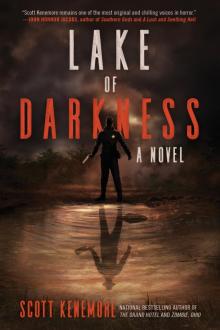 Lake of Darkness
Lake of Darkness The Zen of Zombie
The Zen of Zombie Zen Of Zombie (Zen of Zombie Series)
Zen Of Zombie (Zen of Zombie Series)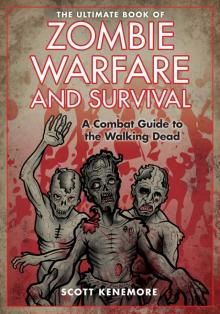 The Ultimate Book of Zombie Warfare and Survival
The Ultimate Book of Zombie Warfare and Survival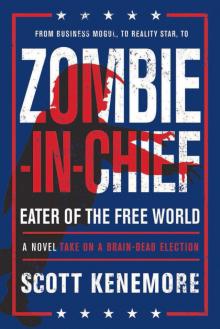 Zombie-in-Chief
Zombie-in-Chief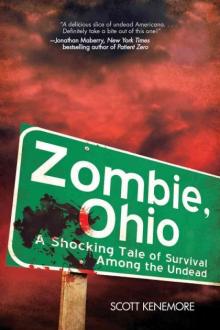 Zombie, Ohio
Zombie, Ohio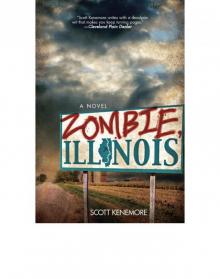 Zombie, Illinois
Zombie, Illinois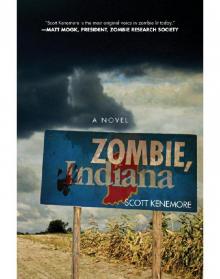 Zombie, Indiana
Zombie, Indiana